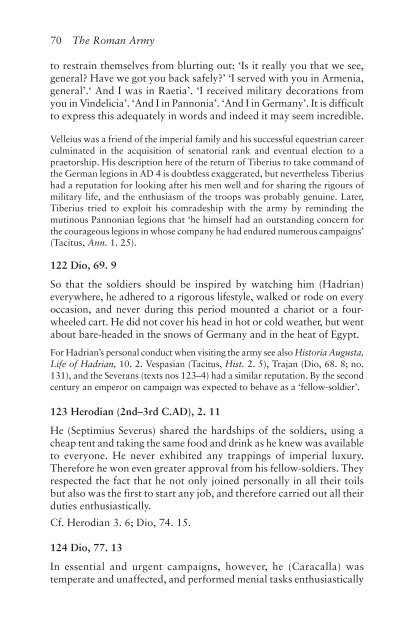The Roman Army, 31 BC–AD 337: A Sourcebook
The Roman Army, 31 BC–AD 337: A Sourcebook
The Roman Army, 31 BC–AD 337: A Sourcebook
Create successful ePaper yourself
Turn your PDF publications into a flip-book with our unique Google optimized e-Paper software.
70 <strong>The</strong> <strong>Roman</strong> <strong>Army</strong><br />
to restrain themselves from blurting out: ‘Is it really you that we see,<br />
general? Have we got you back safely?’ ‘I served with you in Armenia,<br />
general’.‘ And I was in Raetia’. ‘I received military decorations from<br />
you in Vindelicia’. ‘And I in Pannonia’. ‘And I in Germany’. It is difficult<br />
to express this adequately in words and indeed it may seem incredible.<br />
Velleius was a friend of the imperial family and his successful equestrian career<br />
culminated in the acquisition of senatorial rank and eventual election to a<br />
praetorship. His description here of the return of Tiberius to take command of<br />
the German legions in AD 4 is doubtless exaggerated, but nevertheless Tiberius<br />
had a reputation for looking after his men well and for sharing the rigours of<br />
military life, and the enthusiasm of the troops was probably genuine. Later,<br />
Tiberius tried to exploit his comradeship with the army by reminding the<br />
mutinous Pannonian legions that ‘he himself had an outstanding concern for<br />
the courageous legions in whose company he had endured numerous campaigns’<br />
(Tacitus, Ann. 1. 25).<br />
122 Dio, 69. 9<br />
So that the soldiers should be inspired by watching him (Hadrian)<br />
everywhere, he adhered to a rigorous lifestyle, walked or rode on every<br />
occasion, and never during this period mounted a chariot or a fourwheeled<br />
cart. He did not cover his head in hot or cold weather, but went<br />
about bare-headed in the snows of Germany and in the heat of Egypt.<br />
For Hadrian’s personal conduct when visiting the army see also Historia Augusta,<br />
Life of Hadrian, 10. 2. Vespasian (Tacitus, Hist. 2. 5), Trajan (Dio, 68. 8; no.<br />
1<strong>31</strong>), and the Severans (texts nos 123–4) had a similar reputation. By the second<br />
century an emperor on campaign was expected to behave as a ‘fellow-soldier’.<br />
123 Herodian (2nd–3rd C.AD), 2. 11<br />
He (Septimius Severus) shared the hardships of the soldiers, using a<br />
cheap tent and taking the same food and drink as he knew was available<br />
to everyone. He never exhibited any trappings of imperial luxury.<br />
<strong>The</strong>refore he won even greater approval from his fellow-soldiers. <strong>The</strong>y<br />
respected the fact that he not only joined personally in all their toils<br />
but also was the first to start any job, and therefore carried out all their<br />
duties enthusiastically.<br />
Cf. Herodian 3. 6; Dio, 74. 15.<br />
124 Dio, 77. 13<br />
In essential and urgent campaigns, however, he (Caracalla) was<br />
temperate and unaffected, and performed menial tasks enthusiastically



